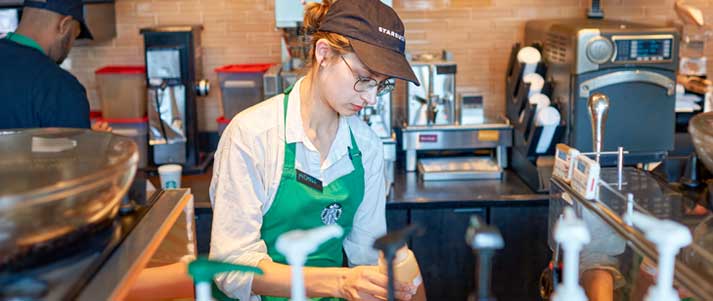How to find a part-time job
Finding a part-time job to supplement your Student Loan will not only give you more cash to play with, but it's great for your CV too. Here's how it's done...

Credit: (left) Sorbis, (right) JHVEP Studio– Shutterstock
Unfortunately, Maintenance Loans aren't enough to cover living costs for many students.
For context, students in our latest National Student Money Survey spent an average of £1,104 per month. However, the average Maintenance Loan for English students in 2023/24 was equivalent to around £600 per month.
It's perhaps not surprising, then, that 58% of surveyed students had part-time jobs.
By getting a job, you could start earning a regular, reliable income. This will make a huge difference if you (like so many others) find that your Student Loan isn't big enough.
However, it's worth noting that part-time jobs don't come easy. First, you've got to decide what it is you want to do and then put in the effort to secure a job.
What's in this guide?
How to get a part-time job
Here are the most effective ways to get a part-time job:
-
Look for part-time jobs far in advance
When looking for a job, it's best to start your search as early as possible. You might not get a job straight away, so don't wait until you actually need to start working to begin sending your applications.
Hit the ground running by scouting out part-time positions online and applying for a few jobs before you start university. This way, you'll avoid peak job-hunting season.
Everyone will be looking for work during freshers' week. So if you're already at the interview stage, you're in for a great chance.
-
Write a brilliant CV

Credit: everydayplus – Shutterstock
Regardless of the type of job you're applying for, you'll need a CV that makes you stand out among other applicants.
Your first stop should be our guide to writing the perfect CV. Even if you think you've already nailed yours, it's worth reading through our tips to make sure it's A+ quality.
Keep a copy of your standard CV, then tailor it for each application. For example, if a job advert specifically asks for communication and organisational skills, make sure your CV clearly shows that you have these qualities. It's also a good idea to back your skills up with any relevant experience.
-
Triple check your details
Students are renowned for changing their contact details regularly. Make sure you always check that the info you're giving to potential employers is up to date.
Also, be careful to avoid typos. This should be the case throughout your application, but especially in the section with your contact details.
Pay attention to the email address and phone number you include on your application. Recruiters will use these details to contact you about interviews.
We'd also advise against listing a Hotmail email address as they're the least professional-looking of the bunch. Instead, you could get an Outlook or Gmail address.
-
Take part in extracurricular activities
We know it seems like a vicious cycle, but having a bit of experience on your CV makes it much easier to land a job. If you haven't had a job before, don't worry. There are plenty of other things you can do to improve your job applications.
Not sure which ones to try? We have a guide with the best extracurricular activities for you.
You could also try volunteering, helping out a family friend with their business or creating a website to stand out.
-
Be enthusiastic as a job applicant

Credit: Andrey_Popov – Shutterstock
By following up on your applications and asking for updates, you show employers you are keen. Putting in a bit of effort to stay in touch throughout the process will go a long way. Just make sure not to bother them too often.
And, if you have a job interview, it's always worth sending a quick email afterwards to thank the interviewer for their time. This shows you're genuinely interested in the job and that you're polite, warm and appreciative of the opportunity.
-
Put your social media settings on private
Of course, there is a distinction between your work and personal life. However, employers are unlikely to hire you if your social media is filled with photos of drunken nights out.
You can turn your accounts to private mode or make sure your social media looks professional. If you use social media in the right way, it may even help you land a job!
Where to look for part-time jobs
Here are the best places to find a part-time job for students:
-
Part-time job search tools
Knowing where to look online is essential for getting a good part-time job. The company website is a good place to start. Here, they will advertise their job vacancies.
We may be biased, but our part-time job search engine is the best one out there for students looking for work at university. It's constantly updated, so keep an eye out for new postings.
Also, sign up for job websites. Sites like CV-Library, for example, will notify you when part-time positions pop up in your area.
-
Social media

We touched on this earlier, but social media is perfect for job hunting.
As well as looking directly on companies' websites to find vacancies, have a look at their social media pages as well.
They will likely share their job opportunities on sites like X (formerly Twitter), Instagram and Facebook. If this is the case, you can like or respond to the post. But before you do, make sure your social media looks professional.
It's also worth checking any Facebook groups for students in your university city. Local bars, coffee shops and retail stores often post job openings in groups like this to attract students. Alternatively, you can see if there are any hospitality Facebook groups in your city (if you want to work in hospitality).
Check out our extensive guides on how to use LinkedIn, X and other social media platforms to find a job.
-
University jobs fairs
Many universities will organise job fairs throughout the year. These give you the chance to meet employers directly. It's a great opportunity, so check when your uni will be hosting a career fair and be sure to pop along.
To get the most out of a uni job fair, find out which companies will be attending. Research them beforehand and arrive armed with notes and questions.
After talking to recruiters at fairs, ask for their card and follow up with an email afterwards. In the email, it's a good idea to remind them who you are and thank them for chatting with you. You can also ask them to stay in touch about part-time jobs if any become available.
As well as going to job fairs, check if your university has a JobShop service. Through this, you might be able to find a part-time job in their shops, bars and on open days.
-
Recruitment agencies
Recruitment agencies are a lot like matchmaking services. But instead of helping you find love, they find you a job.
They usually have a database of positions waiting to be filled. Before signing up, check out our full guide to getting the most out of recruitment agencies.
-
Your network

Credit: Dean Drobot– Shutterstock
Lucky enough to have friends or family working at a company you're interested in? They might be able to give you a heads-up when a new job opens up, or even put in a good word for you.
If all else fails, just ask the old-fashioned way. When it comes to finding part-time jobs, it can be effective to walk into a place with your CV and ask if there are any jobs going.
And don't be afraid to ask for a job in a store, cafe or pub without a "help wanted" sign on their window. You'll never know what's available until you ask!
It might seem a bit daunting at first, but once you've got past the first couple, it will get much easier.
Should you get a job at university?
Before committing to anything, it's worth asking yourself if a part-time job is right for you.
Firstly, work out exactly why you want a part-time job. Are you doing it purely for the money, to bulk out your CV, or to meet new people?
If you're doing it just for the money, make sure you work out what your monthly budget is first. Sitting down to work out your incomings and outgoings will give you a clear idea of exactly how big a shortfall you need to make up for.
You might even find you don't need a job after all. A few small money-making tricks here and there could be enough to give you some pocket money.
It's also worth noting that, although juggling a job at uni will look great on your CV, there are other ways to improve it. You can do some work experience or get involved in some extracurricular activities, for example. These come with the added bonus of being short-term commitments that shouldn't impact your studies too much.
It's crucial to sit down and work out how much time you can commit to a job. Can your timetable really accommodate a part-time job? A lot of universities would advise working in a part-time job for no more than 15 hours a week during term time, but this will vary for individuals.
Recommended part-time jobs for students

Credit: Sorbis – Shutterstock
When finding a part-time job, it's worth focusing on these industries:
-
Retail
- Pros – Temp work available over Christmas, staff discount, no experience required.
- Cons – Hours can be inconsistent, weekend work is often required, lots of competition for jobs.
Working in retail could include anything from your local supermarket to working in a clothes store. You can expect to be working on the tills, offering customer service and stocking shelves.
Retail is one of the easiest industries to find work in if you haven't yet got any prior work experience. To find a part-time job in local independent stores, it's worth walking up to whoever is in charge with a CV in hand.
However, for major chain stores, we suggest looking at the career section on their websites. Here, you'll see if they have any part-time jobs available in your area. Once you've found some jobs that appeal, you'll be able to fill in applications for the roles online.
A part-time job in retail is easiest to get around Christmas time, as this is when stores are most in need of staff. If you're not too busy revising for exams, start applying for jobs in October or November to increase your chances of landing a job.
-
Service industry
- Pros – Free food, possible tips on top of your wages, often no prior experience needed.
- Cons – Can be tiring, late/long hours, can leave you feeling a bit greasy and smelly.
This includes everything from working at McDonald's and being a barista to working as the front-of-house in a high-end restaurant.
Duties typically involve taking orders and waiting tables. If you're working in the fast-food industry, you might be cooking food and washing dishes, too.
Did we mention there's likely to be some free food involved in these kinds of jobs? You can see why part-time jobs in this field have always been popular with students.
-
Bar work
- Pros – Uni bars can be flexible during holidays and exam seasons, evening shifts won't clash with your timetable.
- Cons – Late hours, high probability of dealing with drunk customers.
As well as working as bar staff, you may also be able to find paid part-time work collecting glasses, monitoring a club's cloakroom, cleaning, promoting events and more.
With almost every university town having enough bars to keep you drinking for the entirety of your degree, there's a lot of potential work waiting to be found.
Many part-time student jobs will fall into one of the above three categories. But bear in mind that there are loads of alternative jobs that you probably haven't even considered yet.
Wondering what part-time jobs make the most money? We've listed them in our best-paid part-time jobs for students guide...








